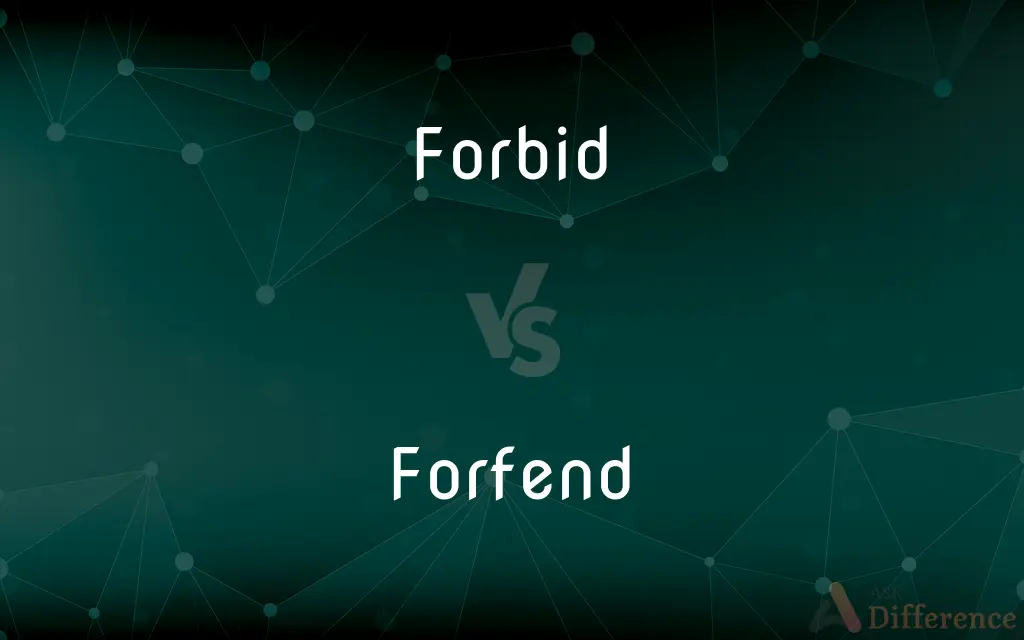Forbid vs. Forfend — What's the Difference?
By Tayyaba Rehman & Urooj Arif — Updated on April 27, 2024
Forbid implies officially or authoritatively prohibiting something, while forfend, a more archaic term, means to prevent or protect against something.

Difference Between Forbid and Forfend
Table of Contents
ADVERTISEMENT
Key Differences
Forbid is commonly used to express a prohibition imposed by authority or law, indicating that a specific action must not be taken. Forfend, on the other hand, is rarely used in modern English and carries a sense of warding off or averting something undesirable.
When one says they forbid something, it often carries an implication of power or control, such as parents setting rules for children or laws that dictate behavior. Forfend, whereas, tends to imply a wish or prayer to protect someone from harm or an undesirable outcome.
In legal or formal contexts, forbid is frequently employed to establish clear boundaries or rules. Forfend does not typically appear in these contexts, leaning more towards literary or historical usage, emphasizing an archaic tone.
Usage of forbid spans various contexts, from informal to formal, and is understood universally. Forfend, on the other hand, might require clarification due to its rarity and archaic resonance in modern language.
The tone of forbid can be stern and direct, reflecting the seriousness of the prohibition. Forfend often carries a lighter, sometimes almost superstitious tone, suggesting an earnest desire to avert evil or difficulty rather than enforce a rule.
ADVERTISEMENT
Comparison Chart
Meaning
To prohibit by authority
To avert or prevent
Usage Frequency
Common
Rare, archaic
Context
Legal, personal, formal
Literary, historical
Tone
Authoritative, direct
Protective, superstitious
Modern Relevance
Universally understood
Seldom used, often unclear
Compare with Definitions
Forbid
To rule out; exclude.
His character forbids any suspicion of dishonesty.
Forfend
To protect or guard.
The charm was worn to forfend against evil.
Forbid
To prohibit an action or activity.
The law forbids texting while driving.
Forfend
To ward off.
She held up a cross to forfend the vampire.
Forbid
To deny permission.
The museum forbids flash photography.
Forfend
To avert or avoid.
They took steps to forfend any criticism.
Forbid
To order someone not to do something.
The sign forbids entry to the construction site.
Forfend
To prohibit, in a protective sense.
Measures were taken to forfend theft.
Forbid
To make impossible; prevent.
The lack of funds forbids further investment.
Forfend
To keep away or prevent.
He prayed to forfend disaster.
Forbid
To command (someone) not to do something
I forbid you to go.
Forfend
To keep or ward off; avert.
Forbid
To command against the doing or use of (something); prohibit
Forbid smoking on trains.
Forfend
(Archaic)To forbid.
Forbid
To have the effect of preventing; preclude
Discretion forbids a reply.
Forfend
(archaic) To prohibit; to forbid; to avert.
Forbid
(transitive) To disallow; to proscribe.
Smoking in the restaurant is forbidden.
Forfend
To prohibit; to forbid; to avert.
Which peril heaven forefend!
Forbid
(ditransitive) To deny, exclude from, or warn off, by express command.
Forbid
(transitive) To oppose, hinder, or prevent, as if by an effectual command.
An impassable river forbids the approach of the army.
Forbid
To accurse; to blast.
Forbid
To defy; to challenge.
What part of "no" do you forbid to understand?
Forbid
To command against, or contrary to; to prohibit; to interdict.
More than I have said . . . The leisure and enforcement of the timeForbids to dwell upon.
Forbid
To deny, exclude from, or warn off, by express command; to command not to enter.
Have I not forbid her my house?
Forbid
To oppose, hinder, or prevent, as if by an effectual command; as, an impassable river forbids the approach of the army.
A blaze of glory that forbids the sight.
Forbid
To accurse; to blast.
He shall live a man forbid.
Forbid
To defy; to challenge.
Forbid
To utter a prohibition; to prevent; to hinder.
Forbid
Command against;
I forbid you to call me late at night
Mother vetoed the trip to the chocolate store
Forbid
Keep from happening or arising; have the effect of preventing;
My sense of tact forbids an honest answer
Common Curiosities
In what contexts might one encounter the word "forfend"?
One might encounter "forfend" in literary or historical texts, or when an author wants to evoke an archaic or formal tone.
What is the origin of the word "forfend"?
The word "forfend" originates from the Middle English "forfenden," derived from "for-" (against) and "fenden" (to defend).
Can "forbid" have any connotations beyond prohibition?
Yes, "forbid" can also suggest a strong disapproval or a command that prevents certain behavior.
How does "forbid" function in legal language?
In legal language, "forbid" is used to formally prohibit certain actions through laws, regulations, or directives.
Can "forbid" imply physical prevention?
Yes, "forbid" can imply physical prevention, as when barriers or physical measures are used to enforce a prohibition.
How might a writer use "forfend" effectively today?
A writer might use "forfend" to give a character's language a dated or formal flavor, or in poetic contexts to invoke a sense of guarding or protection.
What synonyms could replace "forfend"?
Since "forfend" is less common, suitable synonyms might include avert, prevent, or protect, depending on the context.
What is the origin of the word "forbid"?
The word "forbid" comes from Old English "forbēodan," meaning to command against or prohibit.
What emotional response might "forbid" evoke?
The word "forbid" often evokes a sense of restriction or authority, which can be reassuring or oppressive, depending on the context.
What synonyms could replace "forbid"?
Synonyms for "forbid" include prohibit, ban, disallow, and block.
Is "forfend" used in modern legal documents?
No, "forfend" is rarely, if ever, used in modern legal documents due to its archaic nature.
Could "forfend" be seen as more passive than "forbid"?
Yes, "forfend" can be seen as more passive, focusing on prevention and protection rather than direct prohibition, which is a more active and forceful action represented by "forbid."
Does "forfend" carry emotional implications?
Yes, "forfend" can carry emotional implications of care or concern, as it often relates to preventing harm or misfortune.
How does the frequency of use affect the understanding of these words?
Because "forbid" is widely used and understood, its meanings and implications are clear to most speakers. "Forfend," being rarely used, may not be immediately understood and often requires context or explanation.
How do "forbid" and "forfend" reflect cultural differences in their usage?
The use of "forbid" reflects a more direct, authoritative approach typical in Western cultures, while "forfend," with its protective and somewhat superstitious connotations, might reflect older or more traditional societal norms.
Share Your Discovery

Previous Comparison
Baguette vs. Breadstick
Next Comparison
Ferry vs. ShipAuthor Spotlight
Written by
Tayyaba RehmanTayyaba Rehman is a distinguished writer, currently serving as a primary contributor to askdifference.com. As a researcher in semantics and etymology, Tayyaba's passion for the complexity of languages and their distinctions has found a perfect home on the platform. Tayyaba delves into the intricacies of language, distinguishing between commonly confused words and phrases, thereby providing clarity for readers worldwide.
Co-written by
Urooj ArifUrooj is a skilled content writer at Ask Difference, known for her exceptional ability to simplify complex topics into engaging and informative content. With a passion for research and a flair for clear, concise writing, she consistently delivers articles that resonate with our diverse audience.













































